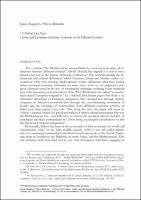Chapter ‘A Port of Two Seas.’ Lisbon and European Maritime Networks in the Fifteenth Century
| dc.contributor.author | Sequeira, Joana | |
| dc.contributor.author | Miranda, Flávio | |
| dc.date.accessioned | 2022-06-01T12:10:29Z | |
| dc.date.available | 2022-06-01T12:10:29Z | |
| dc.date.issued | 2019 | |
| dc.identifier | ONIX_20220601_9788864538570_182 | |
| dc.identifier.issn | 2704-5668 | |
| dc.identifier.uri | https://library.oapen.org/handle/20.500.12657/55999 | |
| dc.description.abstract | With the development of research in economic history, historians are now testing the hypothesis that maritime networks and port cities contributed to the phenomenon of European integration. This essay applies a holistic approach to discuss how the city of Lisbon, located outside the privileged setting of multi-cultural interactions that was the Mediterranean Sea, became appealing to merchants from far and wide in late-medieval Europe. To do so, it examines a whole array of commercial, normative, fiscal, royal and judicial sources from European archives to discuss if it is possible to observe this phenomenon of European integration in fifteenth-century Lisbon. | |
| dc.language | English | |
| dc.relation.ispartofseries | Atti delle «Settimane di Studi» e altri Convegni | |
| dc.subject.other | economic history | |
| dc.subject.other | lisbon | |
| dc.subject.other | portugal | |
| dc.subject.other | commercial networks | |
| dc.subject.other | 14th century | |
| dc.title | Chapter ‘A Port of Two Seas.’ Lisbon and European Maritime Networks in the Fifteenth Century | |
| dc.type | chapter | |
| oapen.identifier.doi | 10.36253/978-88-6453-857-0.18 | |
| oapen.relation.isPublishedBy | bf65d21a-78e5-4ba2-983a-dbfa90962870 | |
| oapen.relation.isbn | 9788864538570 | |
| oapen.series.number | 50 | |
| oapen.pages | 15 | |
| oapen.place.publication | Florence |

